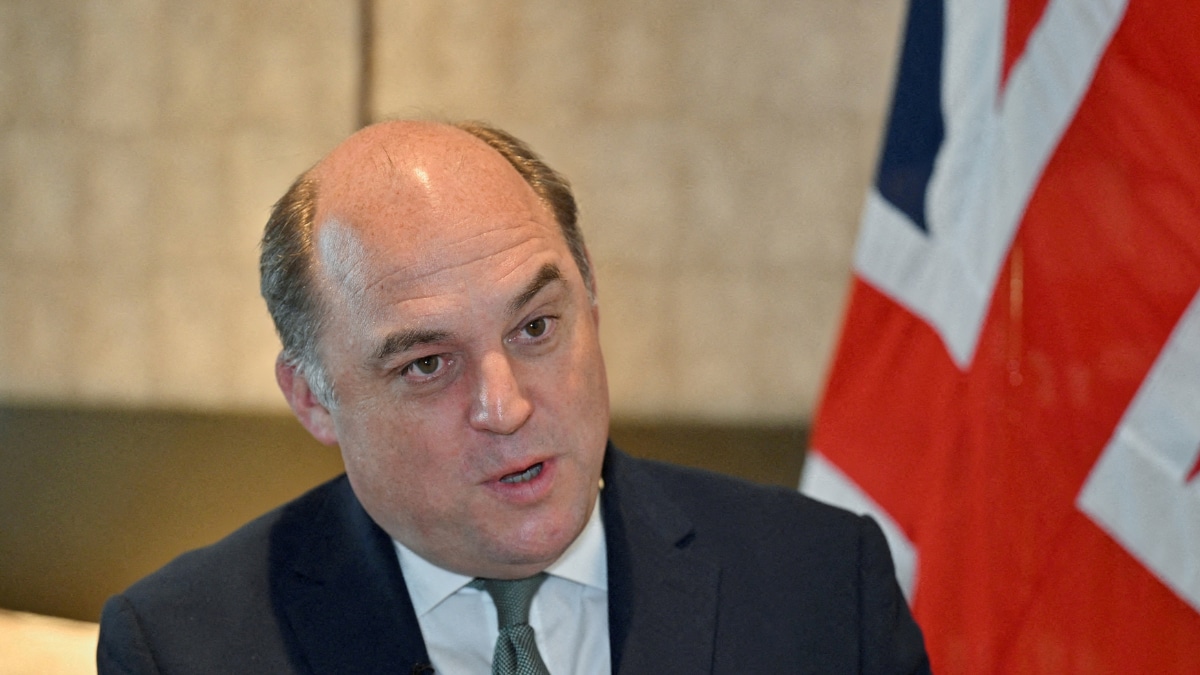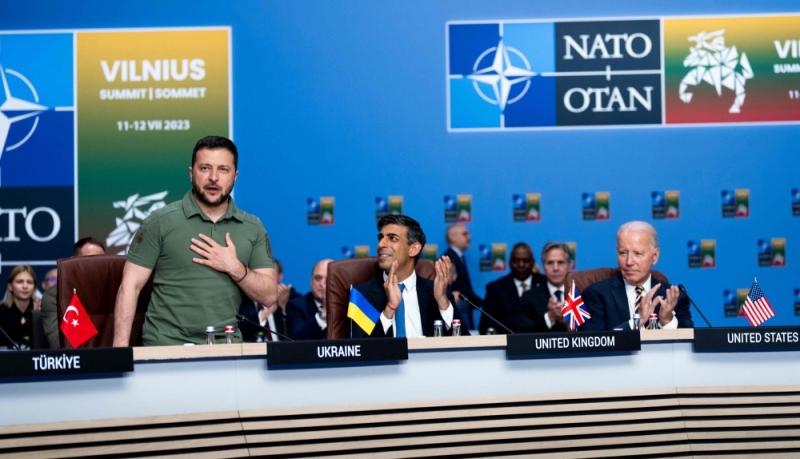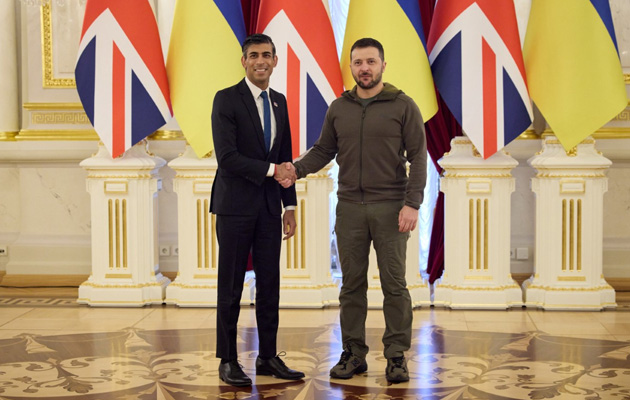
UK Minister Warns West ‘Not Amazon’ for Ukraine Weapons, Zelensky Brushes Off Tension
On Wednesday, UK Defence Secretary Ben Wallace made remarks that deviated from the typically harmonious relationship between London and Kyiv, suggesting that Ukraine should express more gratitude towards its allies and stating that Britain is not an “Amazon” for military supplies.
In response to these comments, British Prime Minister Rishi Sunak swiftly moved to dispel any notion that London was displeased by President Volodymyr Zelensky’s assertive lobbying for increased Western support in the face of the Russian invasion, which he had done during the NATO summit.
President Zelensky himself shrugged off any suggestions of tension in the relationship, indicating that he did not perceive any strained dynamics between Ukraine and the UK.

These developments highlight a momentary discord within the UK-Ukraine relationship, with Defence Secretary Ben Wallace’s comments potentially giving rise to concerns about the level of support provided by the UK to Ukraine in its struggle against Russian aggression.
However, Prime Minister Sunak’s swift response and President Zelensky’s dismissal of any tension aim to reassure that the relationship remains solid. It is not uncommon for differences or miscommunication to occur in international relationships, and the prompt clarifications and positive outlook expressed by both leaders indicate a commitment to maintaining strong ties.
The UK’s support for Ukraine in its battle against the Russian invasion is a crucial aspect of their bilateral relationship, and any perceived strains need to be addressed and resolved to ensure continued cooperation and assistance.
In the face of geopolitical challenges, maintaining unity and collaboration among allies is vital, and it is in the interests of both the UK and Ukraine to work together to address shared security concerns.
Overall, while there may have been a temporary divergence of views expressed by the UK Defence Secretary, the quick response from Prime Minister Sunak and President Zelensky’s dismissal of tension serve as reassurances of the ongoing cooperation and commitment between the UK and Ukraine.
The two-day NATO summit in Vilnius concluded without Ukraine receiving a clear timeframe for joining the alliance, leading to frustrations among Ukrainian officials. Against this backdrop, the comments made by UK Defence Secretary Ben Wallace during the summit sparked embarrassing headlines and raised concerns about potential discord.

Wallace’s remarks, made on the sidelines of the NATO summit, included a word of caution that people expect to see gratitude, whether it is preferred or not. These comments attracted attention and were seen as suggesting that Ukraine should express more gratitude towards its allies, potentially implying a lack of appreciation on Ukraine’s part.
The perceived suggestion of discord or dissatisfaction regarding Ukraine’s response to Western support could be seen as exacerbating the already existing frustrations over the lack of a clear timeline for NATO membership.
Such comments from a high-ranking official can be seen as undermining the solidarity and unity typically associated with the NATO alliance. They may also fuel perceptions of a strained relationship between the UK and Ukraine, particularly regarding Ukraine’s aspirations for NATO membership.
It is important to note that public statements made during sensitive diplomatic moments can sometimes create unintended consequences or misinterpretations. The remarks made by Wallace may have been taken out of context or conveyed differently than intended, potentially leading to misunderstandings or a negative perception of the UK’s stance on Ukraine’s NATO membership aspirations.
The diplomatic landscape surrounding Ukraine’s NATO membership aspirations requires careful handling, with an emphasis on constructive dialogue and support for Ukraine’s security concerns. It is crucial for allies to continue working together and fostering understanding, ensuring that public statements align with the overarching goal of maintaining unity within the alliance.
Moving forward, it is essential for all parties involved to focus on strengthening cooperation, addressing concerns, and finding mutually beneficial solutions. This will help alleviate any potential tensions and promote a positive trajectory towards Ukraine’s aspirations for NATO membership.
In his remarks, UK Defence Secretary Ben Wallace acknowledged the challenges involved in persuading countries to provide military support, even at the expense of their own stockpiles. He recognized the noble nature of the war and highlighted that it is not only fought for the benefit of the countries directly involved but also to safeguard the freedoms of others.
Wallace also noted the need to persuade lawmakers on Capitol Hill, referring specifically to the US Congress. This suggests that securing support and resources from the US government, particularly in terms of military assistance, can be a complex task requiring diplomatic efforts to garner political backing.
The reference to lawmakers on the Hill underscores the significance of political processes and the need to navigate them effectively in order to obtain the necessary support and resources for military operations. It indicates that decision-making bodies, such as the US Congress, play a crucial role in shaping and determining foreign policy and international engagements.
Securing support from lawmakers involves making a compelling case for the cause, highlighting the importance of collective efforts and emphasizing the shared values and interests at stake. It requires diplomacy, negotiation, and effective communication to convey the significance of military operations and the impact they have on protecting freedoms and maintaining global security.
The statements made by Wallace reflect the intricate nature of international alliances and the diplomatic efforts required to maintain unity and cooperation among nations. They also acknowledge the importance of engaging with decision-makers in countries like the United States to secure the necessary backing for military endeavors.
)
Overall, Wallace’s remarks shed light on the complexities of garnering support from countries, including persuading lawmakers, and highlight the diplomatic challenges involved in maintaining alliances and securing resources for military operations.
In addition to the previous comments made by UK Defence Secretary Ben Wallace, he further emphasized the need to persuade skeptical politicians in other countries about the value and benefits of providing military support. Wallace acknowledged the challenges of convincing politicians to allocate resources and emphasized the importance of demonstrating the tangible advantages they would gain from such cooperation.
Furthermore, Wallace recalled a conversation with officials in Kyiv where he used the phrase “I am not Amazon” in response to a list of weapons requests from Ukraine. This remark suggests that the UK cannot simply fulfill all requests for military supplies and highlights the need for a realistic approach in managing expectations.
British Prime Minister Rishi Sunak responded to queries about Wallace’s comments by stating that President Volodymyr Zelensky had expressed gratitude for the support provided by the UK on multiple occasions. Sunak referred to Zelensky’s address to the UK parliament earlier in the year, describing it as incredibly moving, and emphasized that Zelensky has consistently expressed gratitude during their meetings.
Sunak’s response sought to underline the appreciation shown by President Zelensky for the support received from the UK. This serves to counter any perception of discord or dissatisfaction in the UK-Ukraine relationship and reinforces the positive sentiment between the two nations.
The statements by Wallace and Sunak illustrate the complexities of international diplomacy and the challenges associated with securing support and resources for military endeavors. Persuading skeptical politicians in other countries requires effective communication, highlighting the benefits and tangible outcomes that can be achieved through cooperation.
The reference to not being “Amazon” reflects the limitations and constraints faced by countries when it comes to fulfilling all requests for military supplies. It underscores the need for practical considerations and strategic prioritization in the allocation of resources.
In this context, Sunak’s affirmation of President Zelensky’s gratitude reinforces the strong bond between the UK and Ukraine. It indicates that President Zelensky has consistently expressed appreciation for the support provided by the UK, reflecting a positive and cooperative relationship.
Overall, these remarks shed light on the diplomatic efforts required to secure international support for military operations. They highlight the importance of persuasive communication, managing expectations, and demonstrating the mutual benefits of cooperation. The comments from both Wallace and Sunak reflect the ongoing commitment to collaboration and support between the UK and Ukraine.During a summit press conference, Ukrainian President Volodymyr Zelensky responded to queries about the comments made by UK Defence Secretary Ben Wallace. Zelensky expressed exasperation in his tone but reiterated that Ukraine has always been grateful to the United Kingdom, its prime ministers, and the defence minister.
Zelensky thanked the British public for their support and acknowledged the close cooperation between the governments. He then turned to Defence Minister Oleksiy Reznikov, asking if there was a problem in his relations with Wallace. When informed that there was not, Zelensky jokingly suggested that Reznikov extend words of gratitude to Wallace and humorously insisted that Reznikov should call him that day.
Zelensky’s response indicates that Ukraine maintains a grateful stance towards the United Kingdom, its leaders, and the defence minister. While his initial exasperation might reflect a frustration with the questioning, his subsequent remarks showcase a lighter and more humorous tone, highlighting the positive rapport between Ukraine and the UK.
The interaction between Zelensky and Reznikov serves as a lighthearted moment, highlighting the close relationship between the Ukrainian leadership and their counterparts in the UK. The exchange underscores the appreciation and cooperation shared between the two countries.
Overall, Zelensky’s response indicates that Ukraine continues to value and express gratitude for the support and leadership provided by the United Kingdom throughout the conflict. The lighthearted exchange further emphasizes the positive rapport and the mutual understanding between the leaders of both nations.




